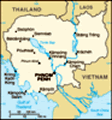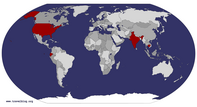Advertisement
Published: January 15th 2011
Siem Reap! So, I'm here in Cambodia, and figured since my travel blog in India seemed to go pretty well I might as well try it again here. If anyone doesn't want to keep getting notifications about these posts, just unsubscribe yourself and you won't be bothered again. (And don't worry, it's not like I get notified if you do, and honestly I wouldn't be insulted anyway =P )
So, 28 hrs after getting on my first plane, finally arrived in Siem Reap, Cambodia! And, got incredibly lucky on the flight over - 3 seats to myself on BOTH the 14 hr flight between Detroit and Seoul, and on the 6 hr flight after from Seoul to Siem Reap!! What are the odds??? *And* my luggage arrived safe and sound! I was rather worried with the 3 transfers that somewhere along the way it'd get lost, but nope. Gotta give props to Delta and Korean Air, good job. (Even if they did make me repack my luggage because I was 1 lb over the weight limit)
First thing that hit me about Cambodia was the *humidity*! It was only about 75 degrees when I got off the plane (itself a lovely welcome, considering it was snowing in all my transfer cities) but the humidity just overwhelms you. I had an e-Visa that I had printed out, and it just immediately started wilting. My program directer Gunther met me at the gate with two Cambodian friends (tiny!! I think they're both (including the male) about 90 lbs...) and off in a tuk-tuk to the hostel. We arrived at midnight, so there wasn't a lot of exploring done the first day, except for my room. Very spare, but large. And the bathroom rather reminds me of a small bathroom in Taiwan/India in how there's no actual tub or area for you to shower in, just a drain in the floor and a hand-held shower spray that you try to aim in such a way as to not soak your towel and everything else. At least this one has a holder for it, so you can wash your hair and/or pretend it's a western shower. =P The people who run our guest house are great. it's mainly this woman, Moi, and then her brother (who also conveniently runs a tuk-tuk), sisters, and various cousins/children/?mother, so all family people. They're very nice, and they work so hard. I can't imagine running a guest house as a living! You never get a day off, and it's always people in and out, in and out, all speaking different languages and asking you for things.
The guest house is also nice in that there are a lot of people who seem to come through here. Most stably, there's a group from VPO, Volunteer Projects Overseas, the organization that originally partnered with Medicorps before they broke into their separate groups. (Medicorps is the volunteer organization I'm in Cambodia for, for those of you who don't know) Various people come and go into the group every now and then, but there are about... 18? of them total now, and most stay for several months at a time, so there are definitely people who have been here for awhile. Most are from Australia and England, though there are also a few Swiss, and one guy from Germany. Most are in their early to mid 20's, doing a gap year or just taking time off from work/school. It's so nice, it's no problem at all for them to take 3-6 months off and just travel! So jealous. Sadly to say there are no other Americans at all, I'm the only one. Apparently we don't volunteer abroad very much... =P
So, work - medicine is *so* different here... I'm trying to remember how it compares to India, and really I'm not sure because then I was in an outpatient setting all the time, while now I'm in the "ICU," though really it's more like a regular inpatient ward, except that the whole thing is 2 rooms, each holding about 14 pts each. Like India there are no curtains/walls, everyone just kinda hangs out together, and patient privacy is completely unheard of. The patients lie on reed mats that they bring in themselves, on top of the mattress, and all food/blankets/comforts have to be brought in by family (which makes those without family especially sad and depressing, because no one even cleans them up if they soil themselves...). When there are too many patients for the number of beds they lie on the mats on the floor, sometimes outside the hospital ward themselves. (I should probably explain that the hospital is not really one big building like in the States - it's more like a college campus, with each division having it's own building on a campus. Thus the ICU is its own building, "chronic diseases" has its own building, etc. Other divisions include Infectious Disease, maternity, pharmacy, surgery.... that's all i can remember right now) Everyone's got an IV hanging, I think almost more because it's something to do then that every pt actually needs it... and because of the limited resources, a lot of the medicine here is actually "best guess" type stuff. For example, they can't do blood cultures, which is a *huge* handicap as far as I can tell... so basically if there's any hint of infection everyone gets Ceftriaxone, and then if they're not getting better, Gentamycin gets slapped on as well (with no monitoring of drug levels or renal function). They have so few antibiotics to choose from, in fact, that the attending can rattle them all off for me at once from memory (there are about 5). Malaria is always on the menu if people are not getting better as well, and they don't tend to use malarone or mefloquine like we do, instead they use this medication from China that's also first line apparently in Vietnam (according to my OCM medline). The name slips my mind right now... begins with an "A" or sometimes quinine. As far as studies they can do blood counts, CBC, chem 7, UA, blood smears, and a few other things. They is X-ray and ultrasound, EKG, but no CT or MRI unless you got to the capital. Resources are, needless to say, spare, and everyone just has to make the best of what they can... like using Atropine to try and slow gut secretions in an attempt to achieve some sort of pain control for pancreatitis, since they don't have any morphine... or anything at all for pain as far as I can tell besides lidocaine, which even that is used sparingly.
The work day, such as it is, is also completely different here as well. At 8AM they have an administrative meeting with all the doctors and bigwigs in the hospital to discuss daily statistics and other mundane issues. Given the size of the hospital, all those people number about 25. Then the ICU attendings leave for a good hr or so to have breakfast, and thus start the day somewhere around 9 or 9:30AM. Then do they "rounds." I use this term loosely because what it basically entails is the nurses pushing around a rolling tray from bed to bed with that particular patient's chart on it. On it is the patient's basic H&P, vitals (which they take only once a day), and a sheet of paper that is carried over day to day with an assessment of the patient (brief - like, "no moaning," or "appears better.") and the meds to be given that day. If you write any order, that only applies to that particular day. Therefore if something is to be given every 6 hrs and you write it Monday, you have to write it all over again Tuesday. Then the doctor looks at the patient, and usually asks a question or two to the patient or the family, who are always nearby. When I say "look" I literally mean *look.* As in, to gaze, to regard, to visualize. Very rarely will a patient actually be touched for a physical exam of any type, and then usually it's only when they're first admitted... if it seems necessary. Usually it's a look, a few questions, some brief scribbling of assessment and orders, then off to the next patient. There are 2 doctors for the ICU, so rounds usually end by 10:30 AM. At 11AM the doctors go home. At 2pm they may or may not return (the one time i checked, it was "not") and for the rest of the day the nurses do their thing and then call the doctor on their cell if something comes up that they have a question about. Apparently this is more or less how it works all over the hospital, except for the ER, for which the doctors stay till the late hour of 11:30AM (with one doctor always on call).
I dunno, it's hard not to make judgements, but it's difficult when you see things that just don't seem like they're being done "right," you know? Especially coming from UMass where the motto is always that 90% of the diagnosis comes from the history and physical, it's hard to go into a system where history is never more than 7-8 questions and a physical exam is a rarity. One patient came in confused and sleepy and was simply assumed to be in alcohol withdrawal, and so far has basically been lying in his own secretions for the past several days, since he has no family here to clean him up. Another pt had a high heart rate into what sounded like 110's but in regular rhythm, fever, and some other symptom, and digoxin was started on her simply to try and slow her heart rate. In other cases people are simply assumed to have malaria if they're not getting better, which I can accept, even though it's pretty rare in Siem Reap, but it's the general assumption of diagnosis in general that has me feeling uneasy on a daily basis. I realize, of course, that a large part of this is secondary to the lack of resources, but at least a physical exam?
Anyway, I started this blog about 3 days ago and just haven't had time to finish. Lots more has happened and I've got much more insight into the country as a whole now, but that'll have to wait for later. It's 7:30 and I'm starving, so off to dinner!
Advertisement
Tot: 0.071s; Tpl: 0.012s; cc: 16; qc: 48; dbt: 0.0451s; 1; m:domysql w:travelblog (10.17.0.13); sld: 1;
; mem: 1.2mb









Yu-hsuan
non-member comment
wow, ICU attendings have a 3 hr work day? scary! how's the food?